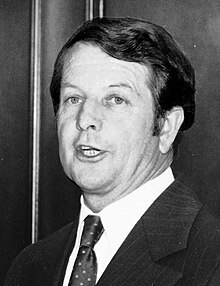Sir Bill Rowling | |
|---|---|
 Rowling in 1974 | |
| 30th Prime Minister of New Zealand | |
| In office 6 September 1974 – 12 December 1975 | |
| Monarch | Elizabeth II |
| Governor‑General | Denis Blundell |
| Deputy | Bob Tizard |
| Preceded by | Norman Kirk |
| Succeeded by | Robert Muldoon |
| 22nd Leader of the Opposition | |
| In office 12 December 1975 – 3 February 1983 | |
| Deputy | Bob Tizard David Lange |
| Preceded by | Robert Muldoon |
| Succeeded by | David Lange |
| 8th Leader of the New Zealand Labour Party | |
| In office 6 September 1974 – 3 February 1983 | |
| Deputy | Bob Tizard David Lange |
| Preceded by | Norman Kirk |
| Succeeded by | David Lange |
| 17th Minister of Foreign Affairs | |
| In office 6 September 1974 – 12 December 1975 | |
| Prime Minister | Himself |
| Preceded by | Norman Kirk |
| Succeeded by | Brian Talboys |
| 33rd Minister of Finance | |
| In office 8 December 1972 – 6 September 1974 | |
| Prime Minister | Norman Kirk |
| Preceded by | Robert Muldoon |
| Succeeded by | Bob Tizard |
| 11th Minister of Statistics | |
| In office 8 December 1972 – 6 September 1974 | |
| Prime Minister | Norman Kirk |
| Preceded by | Robert Muldoon |
| Succeeded by | Mick Connelly |
| 22nd President of the Labour Party | |
| In office 5 May 1970 – 8 May 1973 | |
| Preceded by | Norman Douglas |
| Succeeded by | Charles Bennett |
| Member of the New Zealand Parliament for Tasman Buller (1962–1972) | |
| In office 7 July 1962 – 14 July 1984 | |
| Preceded by | Jerry Skinner |
| Succeeded by | Ken Shirley |
| Personal details | |
| Born | 15 November 1927 Motueka, New Zealand |
| Died | 31 October 1995 (aged 67) Nelson, New Zealand |
| Political party | Labour |
| Spouse |
Glen Elna Reeves (m. 1951) |
| Children | 5 |
| Alma mater | University of Canterbury |
| Signature |  |
| Military service | |
| Allegiance | New Zealand Army |
| Years of service | 1956–61 |
| Rank | |
| Battles/wars | Malayan Emergency |
Sir Wallace Edward Rowling KCMG PC (/ˈroʊlɪŋ/; 15 November 1927 – 31 October 1995), commonly known as Bill Rowling, was a New Zealand politician who was the 30th prime minister of New Zealand from 1974 to 1975. He held office as the leader of the Labour Party.
Before entering politics, Rowling worked as a teacher and briefly served in the army; he became a member of Parliament (MP) in the 1962 Buller by-election. Not long after entering parliament Rowling began to rise through Labour's internal hierarchy, and he was Party President from 1970 to 1973. He was serving as Minister of Finance (1972–1974) when he was appointed prime minister following the death of the highly popular Norman Kirk. His Labour Government's effort to retrieve the economy ended with an upset victory by the National Party in November 1975. Rowling continued to lead the Labour Party but lost two more general elections. Upon retiring from the party's leadership in 1983, he was knighted. He served as Ambassador to the United States from 1985 to 1988.